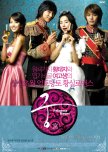
Needless to say is that Bloody Monday is an intense action-thriller that successfully kept my interest in its 11 episode run. Before I get down to knit-picking it, let me just say that for the most part I was pretty sure on how much I liked it. It was a staunch 8/10 from at least episode 3 onwards. Whether that was because Miura Haruma proved to be so efficient at portraying a genius high school boy/hacker whose world is thrown off balance by the intrusion of downright evil and plot-twist-worthy terrorists is a moot point. I try to be objective, but the only proof I have right now is to say that when he cried, I cried. No Kdrama heroine-esqe tears from this boy. I believed him! I was also impressed with the nearly endless series of plot twists, some of which I predicted from day 1 and some of which I never in my wildest dreams saw coming (and I seriously dream plot twist detection - it’s my one consolation before bed that at least my brain is smarter than Dramaland-ish plot twists). In the last five minutes, I hastily changed my 8 to a 9. I like a good emotional twist. So sue me.
While Bloody Monday is an overall exciting watch with notable acting (even among the supporting cast), I’m just going to have to say that thrillers, even more than comedies, come under my scrutiny for gaping plot holes. For instance, I’m pretty sure I could hand in my current resume, and instantly get a job with the number one Japanese intelligence agency (in this drama, Third-i), because obviously my rationale for thinking out logical strategies is higher than half the plans created by the master spooks in Bloody Monday. I also know that when you’re gearing up for a gun-fight, you really shouldn't walk up to your intended target close enough to where your target can easily disarm you and aim that gun directly at your own head. But I digress.
And all plot holes aside, I really did have shivers most of the times I sat down to watch this drama unfold. Having genuine anxiety for fictional characters goes a long way in my book of Appreciating Entertainment 101.
Cet avis était-il utile?

This is such a lovely atmospheric drama, featuring real and recognizable human beings. Eiji is a simple man with a hidden past, and Katori absolutely does not overact in his characterization. He is slow and plodding, and one of the kindest, most selfless creatures you’ll ever see. Yet the drama weaves his past in such a way that the slow unveiling of his life history and the history of the woman he loved is almost as integral to the story as the events that happen in real time. Throw in his obvious affection for Shizuku, and their own adoption of a neighborly grandmother, another loner desperate to feel needed and loved, and just try not having any feels for this beautiful little family structure.
Keep in mind, all this is even before the lovely Mio steps into their lives, cane in hand, full of anxiety and uncertainty about this new direction in her life. And maybe with just a few secrets of her own, hidden behind a web of lies. And perhaps she’s not the only character to have more than one secret.
Conclusion- I love it. All of it. The only reason it doesn't get a perfect score is probably because of some of the pacing issues, but after I’d finished the drama and started to reflect on it, I realize just how lovely it is. I’m not yet that versed in Jdramas, but I think this was a rare find for me.
Cet avis était-il utile?

Cet avis était-il utile?

In some ways, Majo no Jouken was a predictable roller-coaster ride as the ‘forbidden’ couple struggle to find acceptance in a society that doesn’t legally forbid their love, but certainly doesn’t know how to handle it. However, a variety of side characters add to the battle, including Hirose-sensei’s one time fiancé and Hikaru’s young and possessive single mother. And between these two, we get the feeling that there are some things even sicker and twisted than the relatively innocuous age difference of our show’s main lovers.
On a Technical Note:
This drama had me asking questions I never thought I'd worry about. The amount of time I spent surfing the internet studying Japanese legal age of consent; wondering if Japan really does consider it a psychological disorder for a woman to love a high school age boy; curiosity if Japan would really go to such lengths to depict one of the creepiest mothers ever before hinted at; confusion as to why I could care so much about a couple that seems so destined to suffer one crisis after another...
All fruitless efforts, really. Half mushy, half gritty, Majo's romance was a hot whirlwind of a mess, and not afraid of delving into serious life questions. What does a woman do when her boyfriend is uneducated and unemployed, and how does said boyfriend take care of a woman 9 years his senior? There is no instant maturity, no immediate solutions, and not every expectation will be fulfilled as first it was conceived. Kind of like... life.
I almost find it hard to recommend this, because unless you’re in the mood for a torturous road of almost Kdrama level proportions (though at least not in length), Majo no Jouken is a painful drama to watch. Even the initial sweetness of the romance is very nearly spoiled by a traumatic second half. However, if you love seeing actors portraying their characters well, and those characters being well-handled over the course of the drama, or if you just want to see Tackey back when he was young and adorable (as opposed to the older version which is just plain hot), then I guess you should watch it sometime. ;) And hardships aside, the characters really do make a sweet couple. I say that even remembering just how young he is here. At least that much is quite believable.
Cet avis était-il utile?

The Cool Part:
The games themselves are a logician’s masterwork. No twist is foreseeable, and no puzzle unsolvable to the brilliantly minded Akiyama-san. If you like sitting for half an hour – or two - in complete suspense wondering how on earth they will ever manage to win each round through sheer guile, biting your fingernails in anticipation of victory – well that might explain why it’s so highly marathonable. Matsuda Shota plays his part to perfection as the ultimate silent type: an analyst of humans, ever noting the depths of lies and secrets, and calculating every possible move ages before it happens. You’ll find yourself sitting in absolutely stillness waiting for his manipulations to become clear and work their magic.
The Boring Part:
You get the feeling after a while that Akiyama-san will always be there to save the day. And then, the suspense becomes merely repetitive. Having watched half the drama, the pattern for each match firmly memorized, and my brain starting to unravel to keep up with each game’s rules and intricacies, I found myself spacing out. Fortunately, the drama anticipates just such an outcome. Get lost trying to understand the all the players’ plots and maneuverings? No sweat! Before the game ends, there’ll be at least a 20 minute step by step account of how everything happened, and why.
The Real Crux of the Matter:
Games and plotting aside, there’s something very unique about Liar Game’s premise. The story isn’t merely about forcing poor innocent, indebted people to play a game, practically to the death, financial death. Liar Game instead strives to uncover the heart of human nature itself. As the game’s masterful creator intones: “Humans are willing to betray each other in order to survive. Therefore, what’s wrong with deceiving others from the start or living faithfully for your own desires? That’s being human.”
The world he paints in one of black and white, where the black-hearted will always win, and the weak and pitiful will always lose. It’s the cunning versus the trusting, and the pack against the loner, not necessarily evil versus good. To reach the top, humans should or will be capable of stepping on anyone and anything; survival of the smartest, when the risk is losing everything. You lie or you lose.
In Kanzaki Nao, we not only have the most gullible and trusting character ever written; she is an allegory of trust and honesty, absolutely incapable of lying. To the exasperation of the Liar Game Tournament office (or perhaps to their increasing interest), Nao refuses to adhere to their rules. She tries again and again to prove that with teamwork, everyone can win and advance to the next round, maybe not with a profit, but at least debt free. The catch is, if Nao wins, it will disprove everything our Liar Game creator believes in. But for how long Nao can keep the players working together is the only true unknown. It’s a question not even solved by the end of season 1.
Conclusion
It’s hard to fault Liar Game for any real plot holes, especially when it’s obvious that the entire story has purpose beyond plain entertainment, fun, games or romance. Are all the concepts expertly done? Not always. Is it a little cheesy and overly moralistic at times? Absolutely. Will this be my favorite drama of all times, or will I ever rewatch it? No, and most likely not.
But the characters are generally good, and well acted for their roles. Matsuda Shota is fantastic to watch, especially when he gets his game face on. I’d like to say that Erika Toda didn’t overly impress me with her acting, but when her character is an allegory, and mostly unrealistic – that’s something I just can’t make a case out of disliking. Did it detract a little bit from my enjoyment overall? Sure, but then it was a fun ride and eventually I will continue the story, and finish the game another day.
Cet avis était-il utile?

Time Between Dog and Wolf
17 personnes ont trouvé cette critique utile
Cet avis était-il utile?

Unfortunately, what I liked most about the first half is almost what made me bored by the second half. Just about every second lead or side character is actually well-written, and serves a purpose. After a while though, I just wished they'd already serve their purpose, and back off for the sake of my romantic wish-fulfillment. One of the draggiest ends of a drama ever! Though the main storyline is a good one.
Loved the soundtrack! Maybe because this doesn't seem like a prime-time drama, and perhaps becauseit's relatively old, but the music was expertly done, with lots of great little clips of famous pieces (both pop and classical) that helped tell the story almost as much as script.
Sorry though, you'll never catch me wanting to rewatch this one.
Cet avis était-il utile?

Pshh.. This is well documented Korean history.
But that doesn’t mean there couldn’t be more to the story than history has to say. Or that the inner motivations of these highly visible personages were ever truly known by more than themselves or a few other people.
In other words, history always gives us this much leeway to make a romance out of nothing. If you want to approach Jang Ok Jung, Live in Love as infallible history, don’t. But if you’re in the mood for a sweeping epic love story set in historical period based more or less on real people– this might be a good drama for you.
We’re certainly not working with highbrow historical revisionism here.
JOJ: Live in Love is a snapshot of Joseon history ca. 1680s. It's a complicated and very violent story of King Sukjong (before, Crown Prince Lee Soon) and his wives/concubines- among whom are some of the most well known female figures of the age, including the famously tragic Queen Inhyun.
JOJ, however is a romantic and simplified spin on what’s probably 10x more complicated than the drama depicts. I’m actually okay with that, because it does a decent job of making all these events make sense in a way that won’t make your head spin.
But it’s also romantic in that the story it tells is exactly opposite from what history tries to tell. Give a quick thought back to last year’s hit drama Queen Inhyun’s Man, and the depiction you get of Jang Ok Jung is of a conniving bitch. So who wants to see Ok Jung get a makeover? Apparently not Korean audiences, because the ratings were just not there. It took an extra dose of romantic scenes to garner interest in the show. I think it’s shame because despite the unconventional retelling, Jang Ok Jung wasn’t all that bad.
The actors were fabulous, particularly Hong Soo Hyun- she just does sageuk figures so well, and I loved how they played with her Inhyun character in tandem with Ok Jung's dramafied character.
Overall, it was compelling. However, this is history, and history has an outcome that won’t be undone by fiction no matter how good your script is. As for the love between Lee Soon and his beloved concubine/queen, I bought it completely. Even within the grounds of how unhistorical it was that King Sukjong could’ve only had one person he ever loved (or even slept with – because, history says he had tons of concubines and a parcel of children). But I liked how the relationship between the two worked as an anchor for the overall political story. Ok Jung was portrayed as smart and wily, King Sukjong as a master politician, and as such their teamwork was a boon to the storyline. It kept things fresh and interesting at least 80% of the time.
Cet avis était-il utile?

Aoi Ryosuke may have a devil’s curse, but he is terrified of his own abilities, while his counterpart Ryuzaki Shinji is a devil himself, with the gift of god. When they are brought together however, the game really begins.
From beginning to end, the mystery behind their powers drives the plot of the drama: just how much they know about each other and what are the implications of their gift. Is it a curse or blessing, or both, and how are they to be used? What is their purpose on this world? While a larger mythological background is hinted at, I actually appreciated how the drama focused more on the immediate repercussions. This isn’t a tale of gods and demons. It’s the story of two men who behind their powers are just as human as you or me. Their entanglement with Detective Hasebe gives this even more of a humanly-backing as she struggles to learn more about them - to trust or fear, protect or arrest.
“If I were able to change this world, would God be the only one who could allow that? If humans were able to hold God’s powers, would they be able to change the world?”
Thus begins the story as Ryuzaki stands overlooking a city drenched in rain. The camera pans down to reveal Aoi,as he walks into the nearest police station and turns himself in for murder:
“Coming here on my own makes the distinction, of what sort of person I, who has taken away that life, will become.”
The Dog of Orthros: The name comes from Greek mythology. Orthros was a two-headed dog beast (brother of the more famous 3-headed dog Cerberus), and minion to a giant. I'm sure other comparisons could be made between drama and myth, but there's not much known about the dog. Rather, it's more interesting to me that nowhere in the show does it say which man, the angel or the demon, is the actual beast. Both are just two parts of the same whole.
Not to ignore the drama’s political plotline (because, in this kind of scenario unfortunately one just has to exist), but that part was a little more on the predictable side of things – the only questionable outcome is which man, if either, would align with the greedy and power-hungry parties and politicians.
What was more subtly done I thought were many of the side characters, including Detective Hasebe’s young daughter (who often seemed to understand important things better even than her mother), and delinquent youth Kumakiri Masaru (Yaotome Hikaru).
Should you watch it?
I could barely turn away from this drama, and not even the political plotline bored me for more than a few minutes at a time. Like most Jdramas, the romance may be a tiny bit lacking, but the relationship between the three main players was anything but lacking in overall chemistry. The thriller/mystery aspects were also extremely well done (if not completely perfect) but enough that even knowing the outcome, I’d be likely to watch it again.
Read more (with pictures) on my blog:
http://shinealightrose.blogspot.com/2013/03/jdrama-review-orthros-no-inu-2009.html
Cet avis était-il utile?

The drama is basically carried by its lead man’s peculiar charms. Ryu Deok Hwan isn’t an actor I look at and necessarily think “hot!” but he is every bit as charismatic, and his Dr. Han is what initially attracted me to the drama and kept me going. He’s a smart aleck with zero people skills. You’d think this makes him perfect to work with dead bodies, but he’s not actually thrilled to put his surgeon skills to use doing autopsies, and only grudgingly accepting the post because of his sunbae. Why? “Because it smells so bad!”
Detective Kang is standard female detective fare – sharp and deductive, and she gives Dr Han a lot of crap for his faulty and abrasive manners. They’re totally awesome together. If only the drama wasn’t modeled so much on the standard investigation genre, I’d ship them whole-heartedly. However, watching their friendship (and maybe something more?) progress both at work and out of it is very touching. They make a good pair.
The other cast members make a good mix for the rest of the investigation team. Everyone’s got their personalities and their screen time, and the chemistry among them is pretty good. I particularly liked Park Jun Myun as the ‘matriarch’ of the group who starts off being super unimpressed by our little hot-shot newbie but warms up to him later.
What’s This ‘Quiz’ About?
It's primarily an investigation genre show, however I find that for all the dead and dying people the main plot deals with, there’s a lot more on the discussion table – especially about human life. Maybe because Dr. Han struggles with himself as much as with the victims he investigates, but when he’s not being eccentric, he’s deeply conscious about life and human perceptions of life and death.
"People aren't ignorant about rare diseases, but they are ignorant about humanity."
Conclusion:
As long as I was in the mood for this type of story, God’s Quiz really made my day. I probably spent a great deal of time thinking about it long after I finished watching.
The overall plot arc really brought it together too, and I love the contrast of personalities Ryu Deok Hwan put into his character as someone who often seems shallow, but underneath is really a deeply contemplative human being. Unfortunately, I just wish more could’ve been focused on these things and less on the episodic cases.
Read more + pics + episode reviews on my blog at:
http://shinealightrose.blogspot.com/2013/05/kdrama-review-gods-quiz-season-1-2010.html
Cet avis était-il utile?

Sumire the career woman and MatsuJun the obedient dog: Together they are one of the cutest onscreen couples I’ve ever seen. And when I say cute, I do mean cute as in ‘puppy dog’ cuteness. So cute it’s downright awkward.
Yet the strength of the show lies in this very strained and awkward relationship. On one hand, the players are perfectly happy to pretend like it makes sense. He needs a home and someone to feed him, she’s lonely and likes the companionship, especially at the end of a hard day. To come home from work to find a happy pet waiting anxiously for its owner? Tail wagging, happy and desperately giving out the mixed signals of ‘I love you - Feed me!’ No questions asked, no stressful conversations, and no obligations.
It’s a borderline perfect friendship, laced with a dangerous hint of sexual tension. Especially once Sumire begins an actual dating relationship with another man, and neglects to tell him about the ‘pet’ she keeps at home. Tanabe Seiichi plays the ideal boyfriend Hasumi Shigehito, tall and even more career bound – perfect for the haughty Sumire whose shorter ex-boyfriend suffered an inferiority complex. Yet the person that begins to melt Sumire’s cold exterior is not the boyfriend she’s crushed on for years, but the warm and huggable stray living away tucked up in her apartment.
In case you’re worried that this isn’t enough conflict already to see this plot through to the end, fear not. Despite the wtf-premise of boy acting like dog, not everything is always fun and games with this couple, nor is the real issue behind their mutual farce completely ignored. Takeshi/Momo may act like the perfect dog, loving and obedient, but behind the antics is a real human being, sadly cognizant of the reality of the situation. How long can they keep this up and how long he can keep his own feelings hidden drives the plotline of the latter half.
Do I recommend this? Absolutely. Just shut off your brain for a tiny bit and roll with it. It’s a unique romance story adapted from a manga – but unlike others of its origin, the drama’s characters are rarely overdone or overly dramatic. Even MatsuJun as the dog exhibits some depths of character as he switches between the happy-go-lucky puppy and the lone artist, dissatisfied with himself and his life. Sumire is the real face-palming mystery of the show, unsure of herself and her feelings. And yet, her strange behavior could not dampen how fun the drama is overall. I’m already in a re-watching mood, and at 10 episodes, this seems eminently doable.
For some select screencaps, see my original blog article at http://shinealightrose.blogspot.com/2013/02/jdrama-review-kimi-wa-petto-2003.html
Cet avis était-il utile?

Cet avis était-il utile?

What to do.. watch it? or not? If you're taking the "Endless Love Watch All Challenge," then yes. The good news: This is THE most famous of the series, and arguably the best of the four. The bad news is: it's arguably the best of the four.
As a stand alone drama, however, I would actually hazard an opinion that Winter Sonata is a must watch for anyone. Yes it's melodramatic, yes it's a bit plodding. But it does have its own unique charm that is so endearing, and draws its viewer into caring for the characters whether you wanted to or not, so much that I stuck with it to the end, with a bit of help...from the fast-forward button... Just, fast forward every 30-45 seconds for quicker drama flow. You won't miss anything, and it still feels like you watched every moment.
Cet avis était-il utile?

Cet avis était-il utile?

Cet avis était-il utile?





















